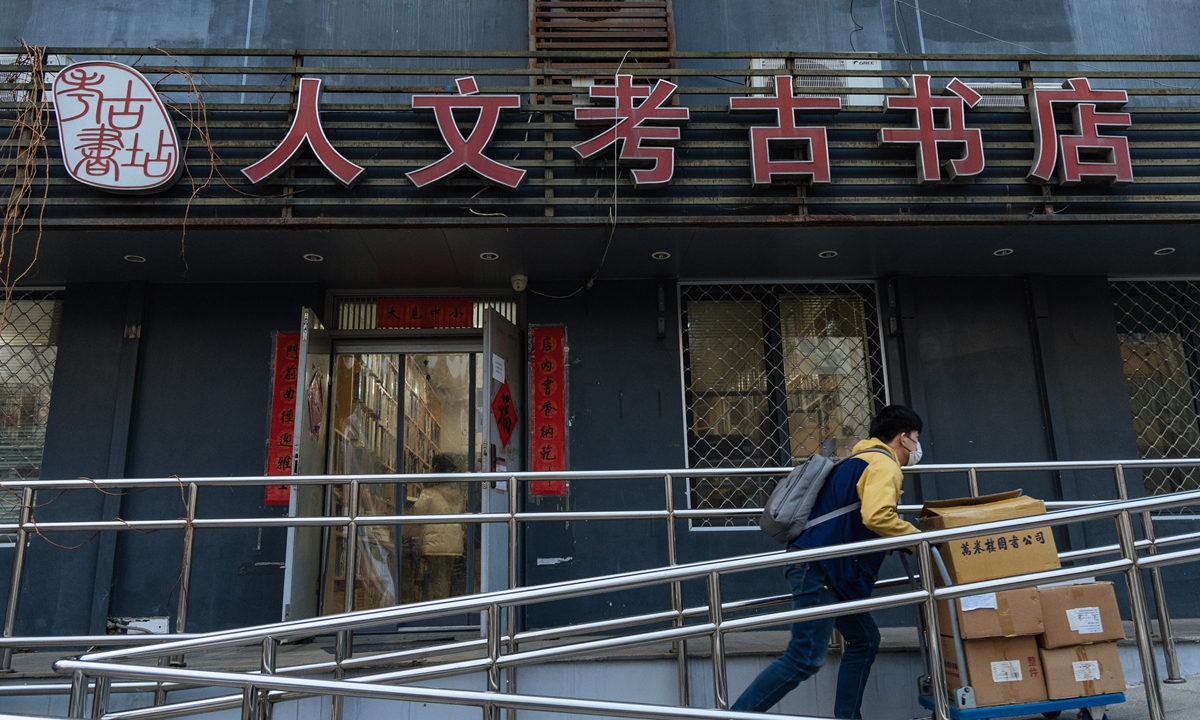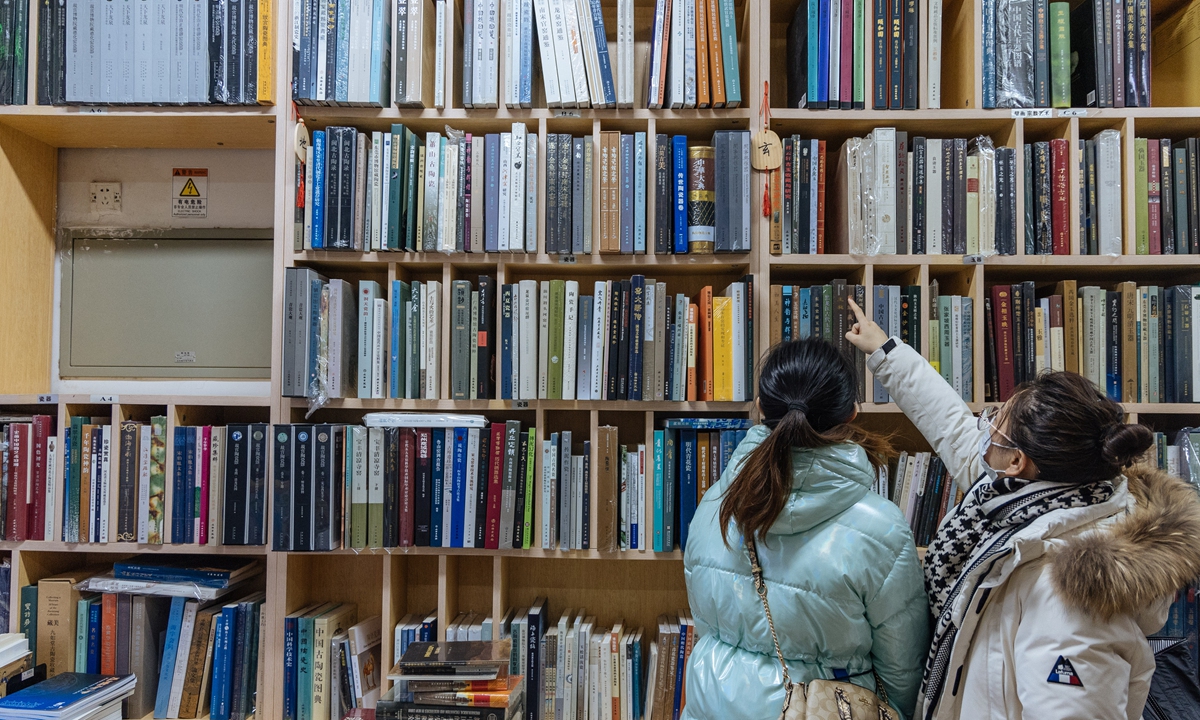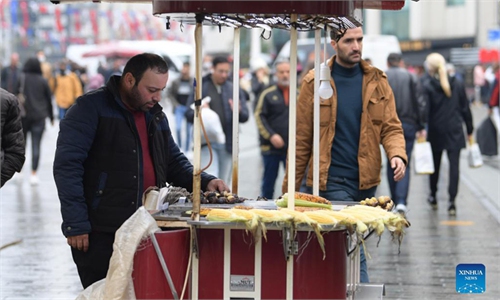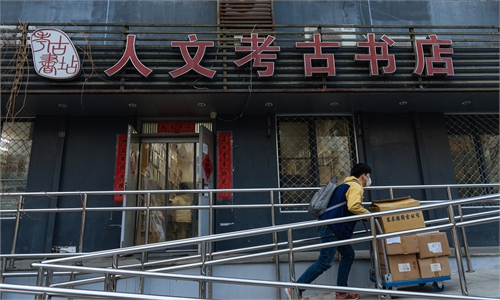ARTS / BOOKS
How China’s only independent archaeology bookstore has survived the digital age
Road to success

The Humanistic Archaeology Bookstore in Beijing Photo: Li Hao/GT

Customers buy books at the Humanistic Archaeology Bookstore in Beijing. Photo: Li Hao/GT
Entering an inconspicuous winding Beijing ally, a book shop named Humanistic Archaeology Bookstore comes into view. Passing through its doors, a reader or two could be seen browsing through the cramped space crammed with shelves full of professional archaeological and cultural books on ceramics, jade, statues, bronze and murals."We have gotten used to having one or two customers per day, and sometimes, it's very common to have nobody the entire day," Hong Xia, the shop manager, told the Global Times, smiling.
It's hard to believe that such a specialized bookstore some 125 square meters in size has managed to survive for almost 10 years despite challenges brought by the rise of e-commerce and the global pandemic.
More surprisingly, the quiet little bookstore, the only independent one in the country dedicated to archaeology and museology, is quiet famous in the fields both in China and abroad.
Opened in 2012, the founder of the book shop, An Yezhi came up with the idea of opening a bookstore specialized in archaeology with the encouragement of her husband and friends who work in the field.
But she had never thought it would be so hard.
Life and death
As a physical bookstore trying to survive in the digital age, Humanistic Archaeology Bookstore has experienced several "dangerous" periods.
Due to the rise of e-commerce, online platforms such as dangdang.com, Taobao and jd.com were having a significant impact on brick and mortar bookstores.
An recalled that many reader service centers at publishing houses had to close at that time. This worried her as Humanistic Archaeology Bookstore, a small private business, seemingly did not have any competitive advantage.
In order to catch up with the times, Hong took the initiative to open online shops on the platforms, which helped the shop get through these difficult times. Meanwhile, An started to send emails to some scholars overseas studying Chinese archaeology. As a result, the number of customers buying books from the shop has gradually increased.
The most impressive scholar overseas for the two women is Lothar von Falkenhausen, a US professor of Chinese Archaeology and Art History at the University of California in Los Angeles, who purchases almost every newly published book in Chinese archaeology from the shop.
"He sends us a list of books that he wants to purchase. I heard he has a super big study in his house which is just like a library that contains numerous books about archaeology. Many US scholars who cannot find a book outside might be able to find it in his study," An said.
She also recalled that before the pandemic, many Japanese scholars researching archaeology would fly to Beijing and come to the bookstore in person to find books, and each time they would buy stacks of books and leave full of satisfaction.
But due to the outbreak of COVID-19, the bookstore again faces another crisis.
"I was very anxious and almost couldn't sleep the whole night. You know, the rent, 250,000 yuan ($39,000) per year, and the salary of our employees… It's all about money. Luckily, we still had the online channels and received subsidies from the local government."
Good word of mouth
"Most of our customers came at the recommendation of their friends, so we attracted them through good word of mouth, especially when it comes to our professional service and timely updated books," Hong said with a hint of pride.
Recently, Hong sent a box of books to Kyle Steinke, a scholar of art history and archaeology at Princeton University. This was the third batch of books Steinke had ordered in 2021, covering various fields including ancient bronze and oracle bone inscriptions. In total, the scholar spent more than 50,000 yuan.
"I have never received such professional service at another bookstore," Steinke said, giving the store high marks.
According to Hong, orders overseas account for about 5 percent of the bookstore's annual sales and a group of archaeologists from the US, Japan, Germany, Austria and other countries are frequent customers.
The physical store brings in about 120,000 to 150,000 yuan in sales per year, while most other revenue comes from its online stores and sales to institutions. The online store has an annual income of about 1.8 million yuan and institutions contribute nearly 3 million yuan.
"Although the annual revenue is 5 million yuan, annual costs of more than 3 million yuan can be deducted, plus labor, rent and office expenses. So annual profit comes out to less than 200,000 yuan, and that profit has become a collection of books in the shop," Hong said.
Hu Dingxin and Zhang Taikang, two PhD students from the Beijing Normal University, came to the shop to purchase books at the suggestion of their mentors and now buy many books for their department each month.
"Many professors in this field are die-hard customers of the store, and the first time we came we were also 'wowed' by the collection of books here. All the books you want can basically be found here," Hu said.
"We don't have a cafe, desserts or music, we just sell books and we will continue doing this down the road," said Hong.




